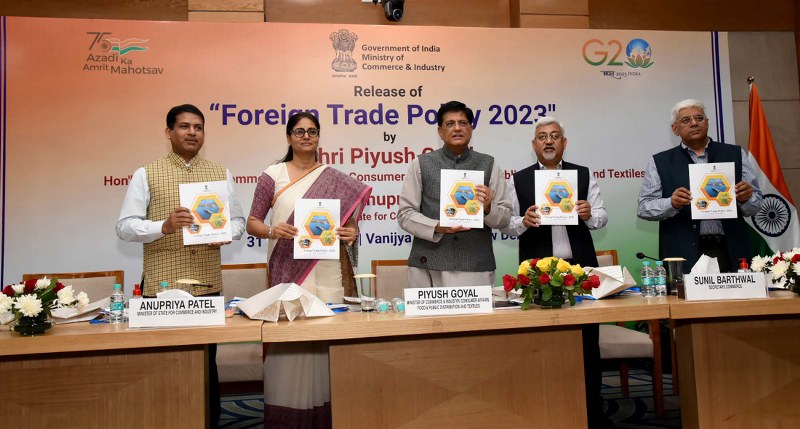 FTP 2023
FTP 2023
India announces Foreign Trade Policy 2023; targets $2 trillion goods and services exports by 2030
New Delhi: India on Friday introduced a "dynamic and adaptable" Foreign Trade Policy (FTP) that will remain in effect indefinitely from April 1 with the objective to attain $2 trillion in goods and services exports by 2030 while also promoting trade settlements in rupees and following the worldwide principle of not exporting duties.
Releasing the new policy, Commerce Minister Piyush Goyal pointed at the rapidly changing nature of global markets that demand swift policy action. Therefore, he said, the new trade policy is agile and does not have a five-year expiration date.
The current Foreign Trade Policy (FTP) 2015-20, which was extended multiple times due to industry demand in response to global uncertainties such as the Covid-19 pandemic and the Ukraine war, is scheduled to expire on March 31, 2023.
The new trade policy is a continuation of the government's existing efforts to enhance exports, Goyal stated. The policy will maintain a collaborative approach to address trade and industry issues, with broad participation from states and districts in promoting exports from the grassroots level.
The minister stressed that India relies on its strengths rather than subsidies to increase exports and is confident of surpassing $760 billion in goods and services exports for the 2022-23 period, which will create a new record.
He expressed confidence that the new policy approach will enable India to achieve $2 trillion in exports by 2030, but also urged the industry to prioritize merchandise exports to keep pace with the rapidly expanding service exports.
Apart from goods and services exports, the FTP 2023 will focus on emerging sectors such as e-commerce, providing all export benefits to e-commerce ventures. Furthermore, the policy has raised the value limit for exports via courier services from Rs 5 lakh to Rs 10 lakh per consignment.
The government is considering the creation of guidelines in collaboration with all stakeholders to encourage e-commerce exports.
According to Santosh Kumar Sarangi, the Director General of Foreign Trade, e-commerce exports have the potential to reach $200-300 billion by 2030.
The FTP 2023 will maintain duty-free imports of inputs and raw materials from foreign suppliers through advance authorization.
The policy will also consolidate Special Chemicals, Organisms, Materials, Equipment, and Technologies (SCOMET) regulations in one place for industry compliance and ease of understanding.
The SCOMET policy aims to harmonise India's export controls with its international commitments under various export control regimes. The policy focuses on simplifying regulations to facilitate the export of dual-use high-end goods and technologies such as drones, UAVs, cryogenic tanks, and specific chemicals.
The new FTP prioritises the ease of doing business using paperless regulations and rule-based automatic approval systems. It has also simplified the export performance threshold, allowing more exporters to qualify for higher recognition and reducing transaction costs. For instance, the qualifying criteria for a five-star exporter have been lowered from $2 billion to $800 million.
FTP 2023 has identified four new Towns of Export Excellence (TEE): Faridabad for apparel, Moradabad for handicrafts, Mirzapur for handmade carpets, and Varanasi for handloom and handicrafts.
These TEEs, in addition to the existing 39 towns of export excellence, will provide global recognition, financial assistance for marketing, and common service provider (CSP) facilities to increase the competitiveness of entire clusters by enabling the shared use of capital goods for exports.
The policy also recommends restructuring the Department of Commerce to prepare it for the future.
Support Our Journalism
We cannot do without you.. your contribution supports unbiased journalism
IBNS is not driven by any ism- not wokeism, not racism, not skewed secularism, not hyper right-wing or left liberal ideals, nor by any hardline religious beliefs or hyper nationalism. We want to serve you good old objective news, as they are. We do not judge or preach. We let people decide for themselves. We only try to present factual and well-sourced news.







